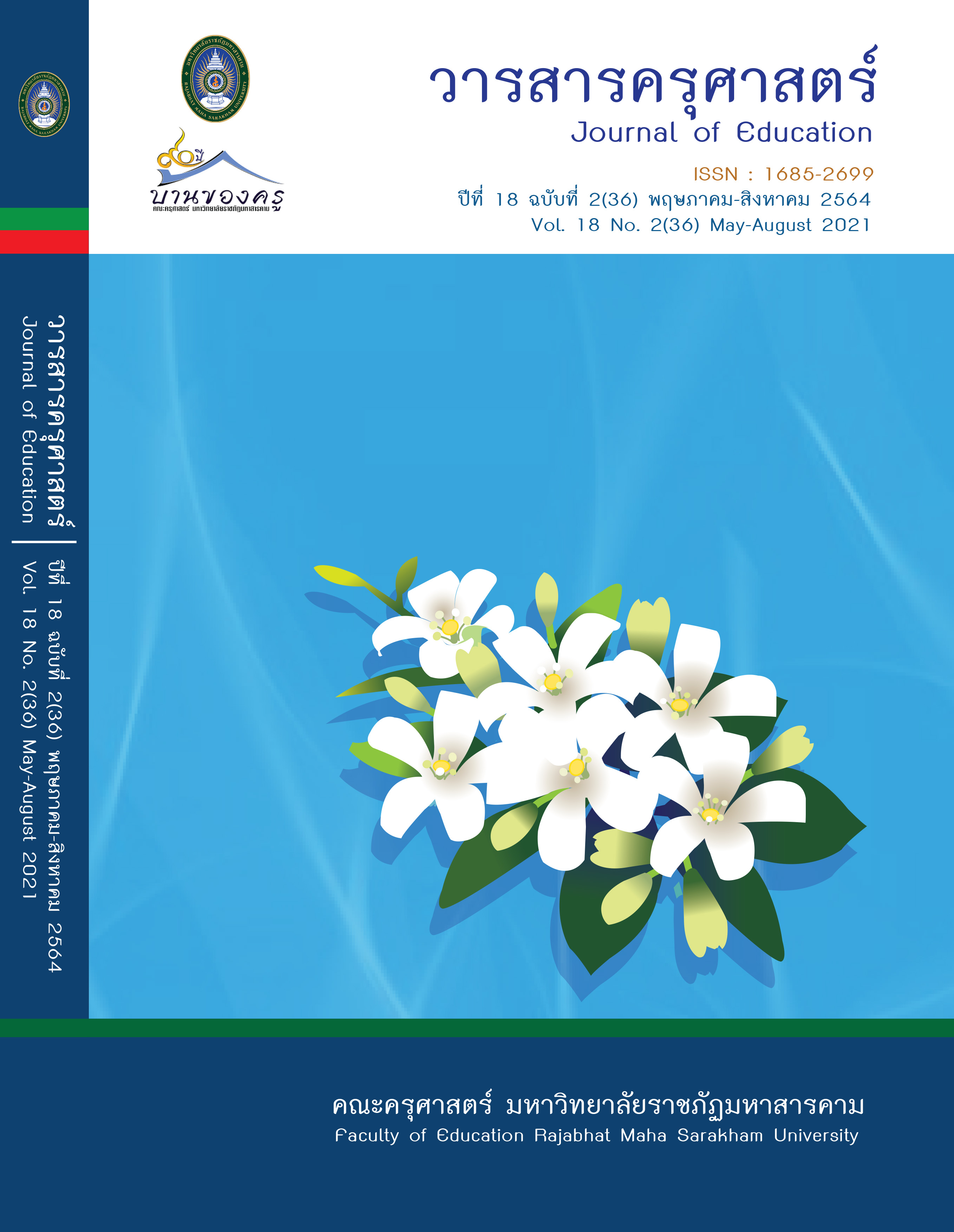TheStrategic Proposals to Develop Learning Person Competency in the Digital Erafor Administrators ofOpportunity Expansion School Under Khonkaen Primary Educational ServiceAreaOffice5
Main Article Content
Abstract
The purpose of this research was to create and validate a strategic proposal to develop learning person competency in the digital era for administrators of opportunity expansion schools under KhonKaen Primary Educational Service Area Office 5. The research methodology was conducted in 2 phases: 1) reviewing related literature and conducting in-depth interviews with the5 selected experts. 2) examination of proposed strategy offered bythe5 experts to assess the propriety, feasibility, and utility of the strategic proposal. The results found that: the strategic proposals to developing learning person competency in the digital era for administrators of opportunity expansion school under KhonKaen Primary Educational Service Area Office 5 were consisted of6aspects: (1) vision with 1 recommendation (2) mission with 1 recommendation (3) goal with 3 recommendations (4) objective with 1 recommendation (5) strategic with 3 recommendations (6) practices with 6 recommendations on learning person competency in the digital era include learning behavior, using of digital media, thinking skill, decision-making and problem solving, and being a professional administrator. Findings from the strategic proposal review results of the propriety ( = 4.51), the feasibility (
= 4.52), and the utility (
= 4.81) which was at the highest level.
Article Details
ข้อกำหนดเบื้องต้นที่ผู้นิพนธ์(ผู้ส่งบทความ) ควรทราบ
1. ผู้นิพนธ์ที่ประสงค์จะลงตีพิมพ์บทความกับวารสาร ตั้งแต่เดือนมกราคม 2563 เป็นต้นไป ให้ใช้รูปแบบใหม่ (Template 2563) โดยสามารถดูตัวอย่างได้ที่เมนู GUIDELINES
2. จะตีพิมพ์และเผยแพร่ได้ ต้องผ่านการประเมินจากผู้ทรงคุณวุฒิ (Peer Review)
3. การประเมินบทความโดยผู้ทรงคุณวุฒิ (Peer Review) เป็นแบบ Double Blind
4. การอ้างอิงบทความใช้หลักเกณฑ์ APA (American Psychological Association) คลิก
5. บทความถูกปฏิเสธการตีพิมพ์ ไม่ผ่านการประเมิน ผู้นิพนธ์ขอยกเลิกเองหรือชำระเงินก่อนได้รับการอนุมัติ ทางวารสารไม่มีนโยบายการคืนเงิน
References
จิราภรณ์ พรหมทอง. (2559). การพัฒนาตนเองให้เป็นบุคคลแห่งการเรียนรู้เพื่อเข้าสู่ศตวรรษที่21. วารสารวิชาการมหาวิทยาลัยฟาร์อีสเทอร์น, 10(2), 63-72.
ชูศรี ต้นพงศ์. (2544). เรียนรู้เพื่อเป็นครูคุณภาพ(พิมพ์ครั้งที่ 3).ดวงกมลสมัย.
ชัยยนต์ เพาพาน. (2558). แนวคิดและทฤษฎีพื้นฐานการเป็นผู้นาของผู้บริหารสถานศึกษาในศตวรรษที่ 21. วารสารบริหารการศึกษา มหาวิทยาลัยขอนแก่น, 12(1), 1-9.https://so02.tci-thaijo.org/index.php/EDMKKU/article/view/56340
ธิดา ประภาศน์สินศุข. (2555). สมรรถนะผู้บริหารมืออาชีพของสถานศึกษาขั้นพื้นฐาน สังกัดสำนักงานคณะกรรมการการศึกษาขั้นพื้นฐาน (ส.พ.ฐ.).วารสารมหาวิทยาลัยพายัพ.23(1). 21 – 38. https://so05.tci-thaijo.org/index.php/pyu/article/view/140287
ธีระ รุญเจริญ และวาสนา ศรีไพโรจน์. (2554).กลยุทธ์การพัฒนาความเป็นบุคคลแห่งการเรียนรู้. ข้าวฟ่าง.
สุจินต์ ชาวสวน. (2555, 21 กุมภาพันธ์). บุคคลแห่งการเรียนรู้.Blogger.http://beauten28.blogspot.com/2012/12/blog-post.html.
รักษิต สุทธิพงษ์. (2560). กระบวนทัศน์ใหม่ทางการศึกษากับการพัฒนาครูไทยในยุคดิจิตอล. วารสารศึกษาศาสตร์มหาวิทยาลัยนเรศวร. 19(2). 344 – 355.
เลอศักดิ์ ตามา และสุมาลี ศรีพุทธรินทร์. (2563).ภาวะผู้นำยุคดิจิทัลของผู้บริหารสถานศึกษาที่ส่งผลต่อการดำเนินงานระบบประกันคุณภาพการศึกษาของสถานศึกษาสังกัดสำนักงานเขตพื้นที่การศึกษามัธยมศึกษา เขต 22.วารสารรัชต์ภาคย์.15(38). 224-240.
วไลพร บุษบก,พิชญาภา ยืนยาว, จิตติรัตน์ แสงเลิศอุทัยและ ปิยะนาถ บุญมีพิพิธ. (2563). องค์ประกอบสมรรถนะของผู้บริหารวิทยาลัยเทคโนโลยีและอาชีวศึกษาเอกชนสังกัดสํานักงานคณะกรรมการการอาชีวศึกษา.วารสารวิชาการสถาบันเทคโนโลยีแห่งสุวรรณภูมิ.6(2). 315 – 325.
วันทนีย์ ศรีบุรินทร์ และ จุไรรัตน์ อาจแก้ว. (2559). การวิเคราะห์องค์ประกอบคุณลักษณะการเป็นบุคคลแห่งการเรียนรู้ในศตวรรษที่ 21 ของนักเรียนชั้นมัธยมศึกษาปีที่ 3 สังกัดสำนักงานเขตพื้นที่การศึกษาประถมศึกษาเลย เขต 1.วารสารมนุษยศาสตร์และสังคมศาสตร์ มหาวิทยาลัยพะเยา.7(2). 1 – 23.
วิทยากร ยาสิงห์ทอง. (2560). ภาวะผู้นำเชิงนวัตกรรมที่ส่งผลต่อการเป็นบุคคลแห่งการเรียนรู้ของครู สังกัดสำนักงานเขตพื้นที่การศึกษามัธยมศึกษาเขต 25. วารสารศึกษาศาสตร์ ฉบับวิจัยบัณฑิตศึกษา มหาวิทยาลัยขอนแก่น. 11(3). 234 – 244.
วิรัตน์ บัวขาว. (2541). หลักสูตรประถมศึกษายุคโลกาภิวัตน์.วารสารวิชาการ.1(9). 8 – 13.
วิโรจน์ สารรัตนะ. (2548).ผู้บริหารโรงเรียน:สามมิติการพัฒนาวิชาชีพสู่ความเป็นผู้บริหารที่มีประสิทธิผล(พิมพ์ครังที่ 5). ทิพย์วิสุทธิ์.วิโรจน์ สารรัตนะ, พระครูสุธีจริยวัฒน์, พระครูธรรมาภิสมัย, พระมหาศุภชัย สุภกิจฺโจ, พระณัฐวุฒิ สัพโส, และ
วิทูล ทาชา.(2561).ภาวะผู้นำสำหรับศตวรรษที่21. วารสารศึกษาศาสตร์ มหาวิทยาลัยนเรศวร.20(1). 261 – 271.
วีรวิชญ์ อารีสวัสดิ์. (2560). สมรรถนะผู้บริหารสถานศึกษา. ใน ดวงสมร รุ่งสวรรค์โพธิ์ (บ.ก.), การประชุมวิชาการนําเสนอผลงานวิจัยระดับชาติ ครั้งที่ 3 “GRADUATE SCHOOL CONFERENCE 2019” (น. 218–228).มหาวิทยาลัยราชภัฏสวนสุนันทา. http://journalgrad.ssru.ac.th/index.php/miniconference/article/view/2058/1914
ศกลวรรณ สุขมี. (2559). การพัฒนาหลักสูตรฝึกอบรมครูการเป็นบุคคลแห่งการเรียนรู้ในสถานศึกษาขั้นพื้นฐาน สังกัดเขตพัฒนาพิเศษเฉพาะกิจจังหวัดชายแดนภาคใต้.วารสารบริหารการศึกษามหาวิทยาลัยศรีนครินทรวิโรฒ.13(25). 85–93.
สุมณฑา พรหมบุญ. (2541). “อาจารย์สตางค์" กับ 40 ปี แห่งความเป็นเลิศทางวิทยาศาสตร์. ใน40 ปี คณะวิทยาศาสตร์ มหาวิทยาลัยมหิดล 2501-2541. มหาวิทยาลัยมหิดล.
Thinnakorn B. and Thippaporn B. (2019). The Status of Digital Leadership of Education Management Administrators. Journal of Educational Studies, 13(2), 285-294.
Fullan, M. (2006). The New Meaning of Education Change. Routledge/Falmer.Reeves, D. B. (2011). Finding your leadership focus. Columbia University.
Oaks, M. M. (2003). Policy research for educational leaders. A concept paper for a two-week intensive workshop for students in Doctoral Program in Educational Administration, KhonKaen University Thailand.
Sanraratana, V. (2013). Krabuan that maithangkansưksa:koranithatsana to kansuksasatawatthiyisip et [New paradigm of education: the case of attitudes towards 21st century education].Thippawisut.
Tashakkori, A., &Teddlie, C. (1998). Mixed methodology: Combining qualitative and quantitative approaches. SAGE Publications.
Wilson, R. C. (2002). Education for Gifted. The University of ChicagoPress.


